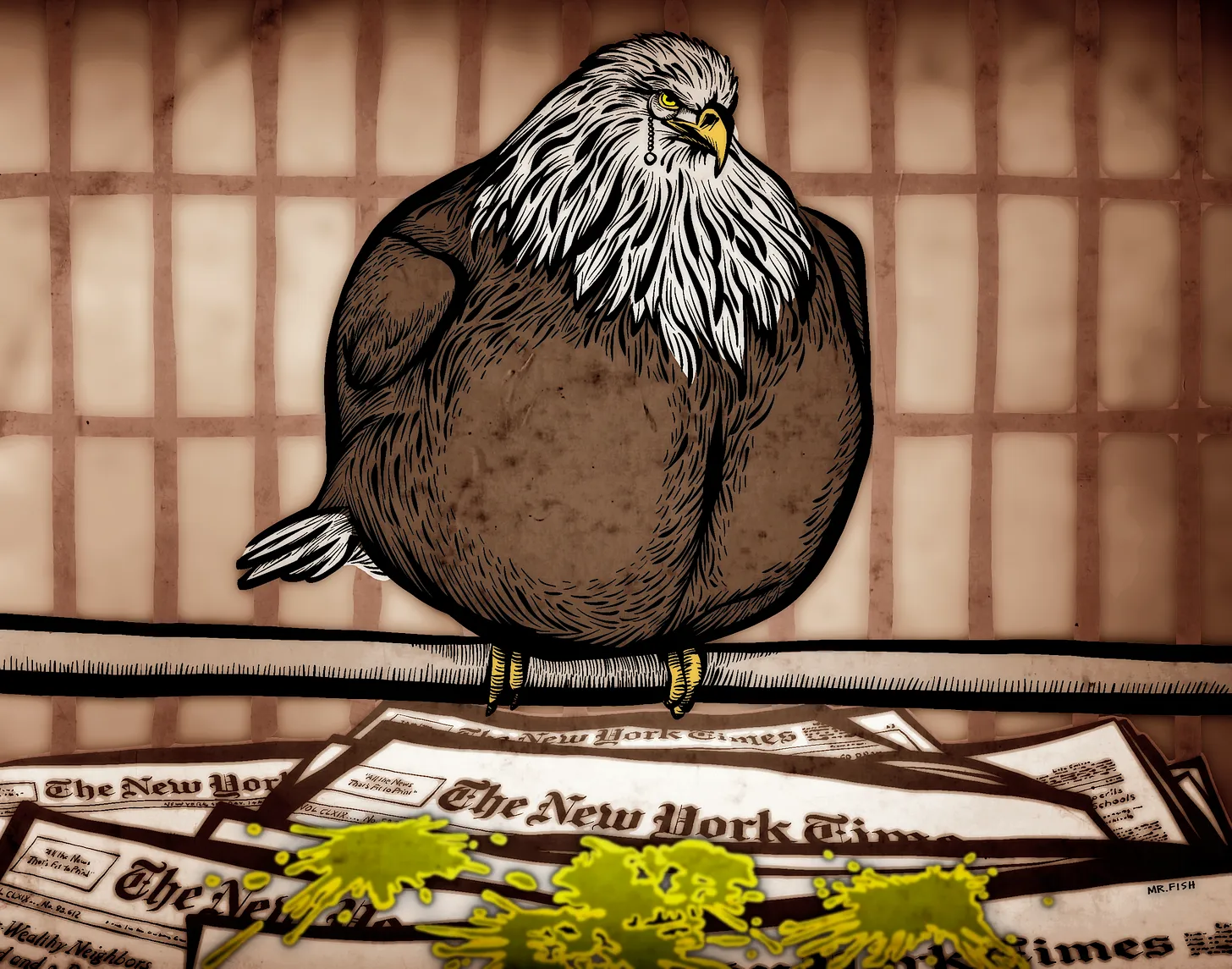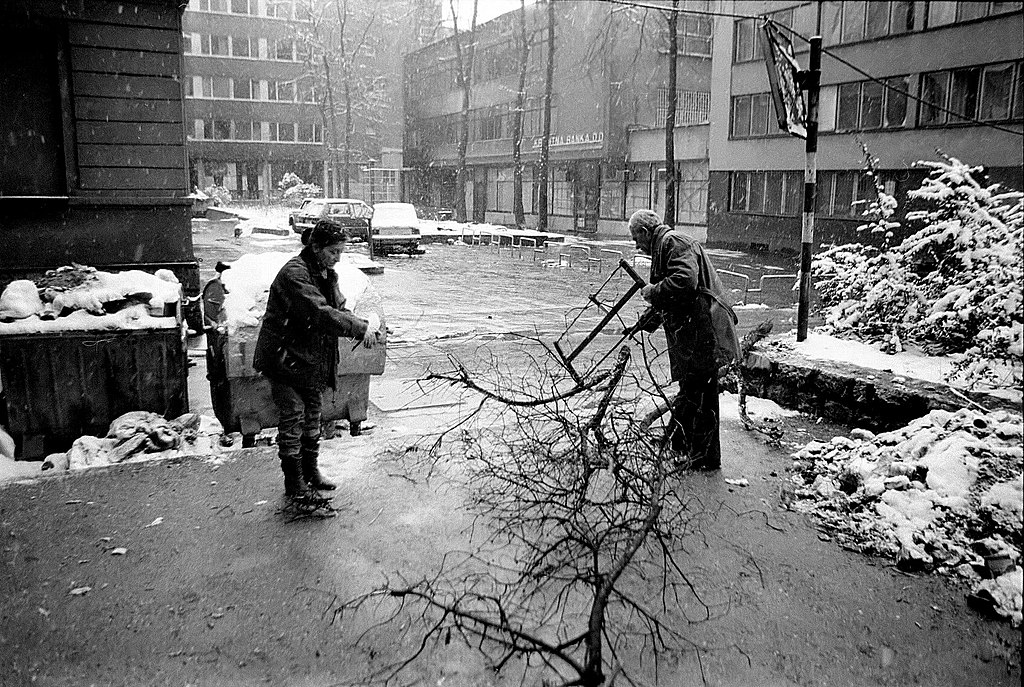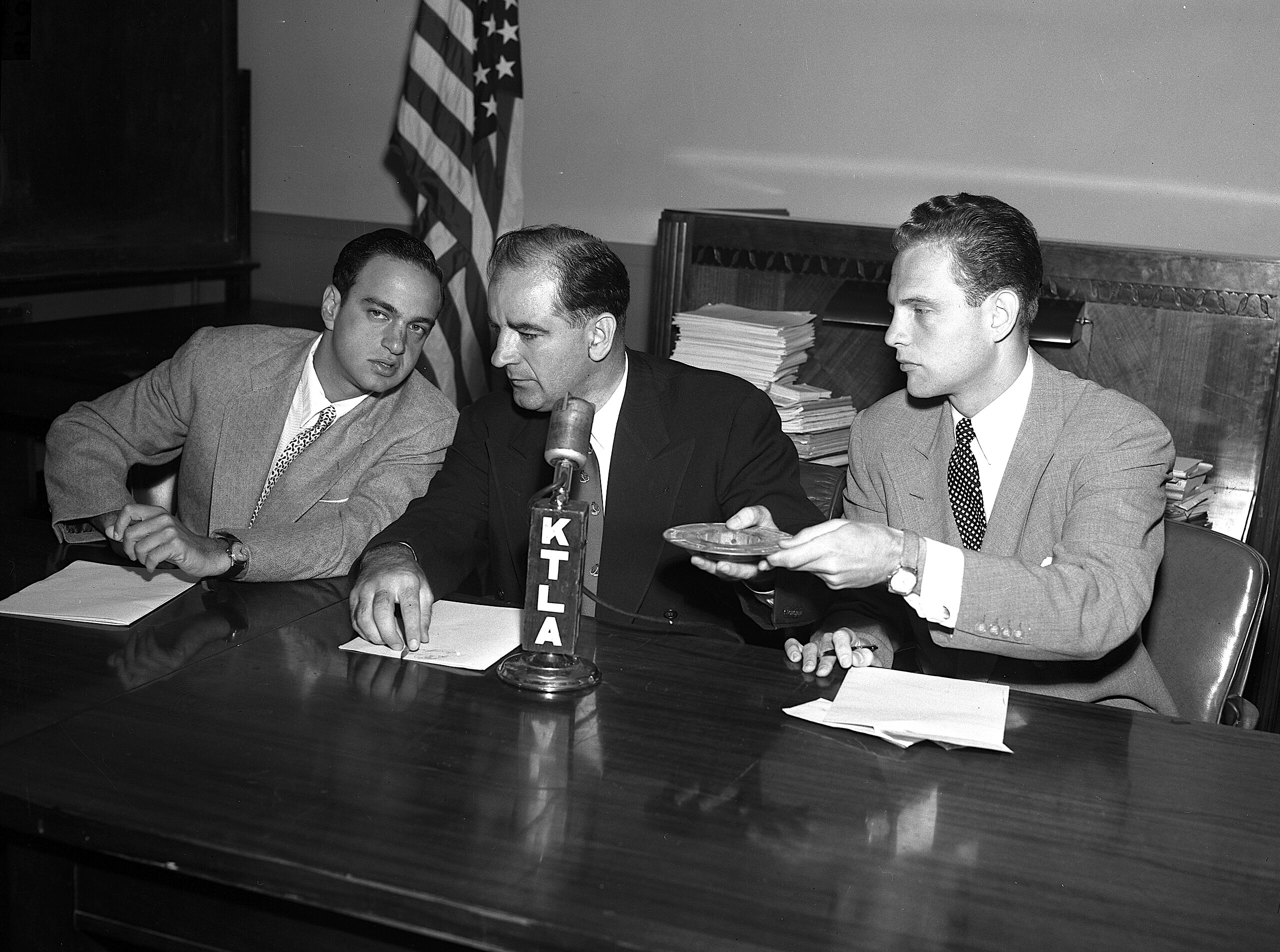Reality rarely penetrates the Byzantine and self-referential court of the paper, which was on full display at the recent memorial for Joe Lelyveld, who died earlier this year.

Requiem for The New York Times – by Mr. Fish.
By Chris Hedges
in New York
ScheerPost
 I am sitting in the auditorium at The New York Times. It is the first time I have been back in nearly two decades. It will be the last.
I am sitting in the auditorium at The New York Times. It is the first time I have been back in nearly two decades. It will be the last.
The newspaper is a pale reflection of what it was when I worked there, beset by numerous journalistic fiascos, rudderless leadership and myopic cheerleading of the military debacles in the Middle East, Ukraine and the genocide in Gaza, where one of the Times contributions to the mass slaughter of Palestinians was an editorial refusing to back an unconditional ceasefire. Many seated in the auditorium are culpable.
I am here, however, not for them but for the former executive editor they are honoring, Joe Lelyveld, who died earlier this year. He hired me. His departure from the Times marked the paper’s steep descent.
On the front page of the program of the memorial, the year of his death is incorrect — emblematic of the sloppiness of a newspaper that is riddled with typos and errors.
Reporters I admire, including Gretchen Morgenson and David Cay Johnston, who are in the auditorium, were pushed out once Lelyveld left, replaced by mediocrities.
Lelyveld’s successor Howell Raines – who had no business running a newspaper – singled out the serial fabulist and plagiarizer, Jayson Blair, for swift advancement and alienated the newsroom through a series of tone deaf editorial decisions.
Reporters and editors rose up in revolt. He was forced out along with his equally incompetent managing editor.
Lelyveld came back for a brief interim. But the senior editors who followed were of little improvement. They were full-throated propagandists – Tony Judt called them “Bush’s useful idiots” – for the war in Iraq. They were true believers in the weapons of mass destruction.
They suppressed, at the government’s request, an expose by James Risen about warrantless wiretapping of Americans by the National Security Agency until the paper found out it would appear in Risen’s book.
They peddled for two years the fiction that Donald Trump was a Russian asset. They ignored the contents from Hunter Biden’s laptop that had evidence of multimillion dollar influence peddling and labeled it “Russian disinformation.”
Bill Keller, who served as executive editor after Lelyveld, described Julian Assange, the most courageous journalist and publisher of our generation, as “a narcissistic dick, and nobody’s idea of a journalist.”
The editors decided identity, rather than corporate pillage with its mass layoffs of 30 million workers, was the reason for Trump’s rise, leading them to deflect attention from the root cause of our economic, political and cultural morass. Of course, that deflection saved them from confronting corporations, such as Chevron, which are advertisers.
They produced a podcast series called Caliphate, based on invented stories of a con artist. They most recently ran a story by three journalists — including one who had never before worked as a reporter and had ties with Israeli intelligence, Anat Schwartz, who was subsequently fired after it was disclosed that she “liked” genocidal posts against Palestinians on Twitter — on what they called “systematic” sexual abuse and rape by Hamas and other Palestinian resistance factions on Oct. 7.
It also turned out to be unsubstantiated. None of this would have happened under Lelyveld.
Reality rarely penetrates the Byzantine and self-referential court of The New York Times, which was on full display at Lelyveld’s memorial.
The former editors spoke — Gene Roberts being an exception — with a cloying noblesse oblige, enthralled with their own splendor. Lelyveld became a vehicle to revel in their privilege, an unwitting advertisement for why the institution is so woefully out of touch and why so many reporters and much of the public despise those who run it.
We were regaled with all the perks of elitism: Harvard. Summers in Maine. Vacationing in Italy and France. Snorkeling in a coral reef at a Philippine resort. Living in Hampstead in London. The country house in New Paltz. Taking a barge down the Canal du Midi. Visits to the Prado. Opera at The Met.
Luis Buñuel and Evelyn Waugh skewered these kinds of people. Lelyveld was part of the club, but that was something I would have left for the chatter at the reception, which I skipped. That was not why the handful of reporters in the room were there.
Lelyveld, despite some attempts by the speakers to convince us otherwise, was morose and acerbic. His nickname in the newsroom was “the undertaker.” As he walked past desks, reporters and editors would try to avoid his glance. He was socially awkward, given to long pauses and a disconcerting breathy laugh that no one knew how to read.
He could be, like all the popes who run the church of The New York Times, mean and vindictive. I am sure he could also be nice and sensitive, but this was not the aura he projected. In the newsroom he was Ahab, not Starbuck.
I asked him if I could take a Nieman Fellowship at Harvard after covering the wars in Bosnia and Kosovo, wars that capped nearly two decades of reporting on conflicts in Latin America, Africa and the Middle East.
“No,” he said. “It costs me money and I lose a good reporter.”
I persisted until he finally told the foreign editor, Andrew Rosenthal, “tell Hedges he can take the Nieman and go to hell.”
“Don’t do it,” Andy, whose father was the executive editor before Lelyveld, warned. “They will make you pay when you come back.”
Of course, I took the Nieman.

The New York Times building. (Thomas Hawk, Flickr, CC BY-NC 2.0)
Halfway through the year Lelyveld called.
“What are you studying?” he asked.
“Classics,” I answered.
“Like Latin?” he asked.
“Exactly,” I said.
There was a pause.
“Well,” he said, “I guess you can cover the Vatican.”
He hung up.
When I returned, he put me in purgatory. I was parked on the metropolitan desk without a beat or assignment. On many days I stayed at home and read Fyodor Dostoevsky. At least I got my paycheck. But he wanted me to know I was nothing.
I met with him in his office after a couple of months. It was like talking to a wall.
“Do you remember how to write a story?” he asked, caustically.
I had not yet, in his eyes, been suitably domesticated.
I walked out of his office.
“That guy is a fucking asshole,” I said to the editors at the desks in front of me.
“If you don’t think that got back to him in 30 seconds you are very naïve,” an editor told me later.
I did not care. I was struggling, often through too much drinking at night to blot out my nightmares, with trauma from many years in war zones, trauma in which neither Lelyveld nor anyone else at the paper took the slightest interest.
I had far greater demons to battle than a vindictive newspaper editor. And I did not love The New York Times enough to become its lapdog. If they kept it up, I would leave, which I soon did.
I say all this to make it clear that Lelyveld was not admired by reporters because of his charm or personality. He was admired because he was brilliant, literate, a gifted writer and reporter and set high standards. He was admired because he cared about the craft of reporting. He saved those of us who could write — a surprising number of reporters are not great writers — from the dead hand of copy editors.
He did not look at a leak by an administration official as gospel. He cared about the world of ideas. He made sure the book review section had gravitas, a gravitas that disappeared once he left. He distrusted militarists. (His father had been a conscientious objector in World War II, although later became an outspoken Zionist and apologist for Israel.)
This, frankly, was all we wanted as reporters. We did not want him to be our friend. We already had friends. Other reporters.
He came to see me in Bosnia in 1996 shortly after his father died. I was so absorbed in a collection of short stories by V.S. Pritchett that I lost track of the time. I looked up to find him standing over me. He did not seem to mind. He, too, read voraciously. Books were a connection. Once, early in my career, we met in his office. He quoted from memory lines from William Butler Yeats’ poem, “Adam’s Curse”:
…A line will take us hours maybe;
Yet if it does not seem a moment’s thought,
Our stitching and unstitching has been naught.
Better go down upon your marrow-bones
And scrub a kitchen pavement, or break stones
Like an old pauper, in all kinds of weather;
For to articulate sweet sounds together
Is to work harder than all these, and yet
Be thought an idler by the noisy set
Of bankers, schoolmasters, and clergymen
The martyrs call the world.
“You still have to find your voice,” he told me.
We were the sons of clergymen. His father was a rabbi. Mine was a Presbyterian minister. Our fathers had participated in the civil rights and anti-war movements. But that is where our family similarities ended.
He had a deeply troubled childhood and distant relationship with his father and mother, who suffered from nervous breakdowns and suicide attempts. There were long periods when he did not see his parents, shuttled off to friends and relatives, where he wondered as a child if he was worthless or even loved, the subject of his memoir Omaha Blues.
We rode in my armored jeep to Sarajevo. It was after the war. In the darkness he talked about his father’s funeral, the hypocrisy of pretending that the children from the first marriage got along with the family of the second marriage, as if, he said, “we were all one happy family.” He was bitter and hurt.

Cutting firewood in Sarajevo during wars that broke up Yugoslavia, 1993. (Christian Maréchal/Wikimedia Commons)
He writes in his memoir of a rabbi named Ben, who “had zero interest in possessions,” and was a surrogate father. Ben had, in the 1930s, challenged racial segregation from his synagogue in Montgomery, Alabama.
White clergy standing up for Blacks in the south was rare in the 1960s. It was almost unheard of in the 1930s. Ben invited Black ministers to his home. He collected food and clothing for the families of sharecroppers who in July 1931 after the sheriff and his deputies broke up a union meeting had engaged in a shoot-out. The sharecroppers were on the run and being hunted in Tallapoosa County. His sermons, preached at the height of the Depression, called for economic and social justice.
He visited the Black men on death row in the Scottsboro case — all of them unjustly charged with rape — and held rallies to raise money for their defense. The board of his temple passed a formal resolution appointing a committee “to go to Rabbi Goldstein and ask him to desist from going to Birmingham under all circumstances and desist from doing anything further in the Scottsboro case.”
Ben ignored them. He was finally forced out by his congregation because, as a member wrote, he had been “preaching and practicing social equality,” and “consorting with radicals and reds.”
Ben later participated in the American League Against War and Fascism and the American Committee to Aid Spanish Democracy during the Spanish civil war, groups that included communists. He defended those purged in the anti-communist witch hunts, including the Hollywood Ten, spearheaded by the House Un-American Activities Committee.

Sen. Joseph McCarthy, center, confers with Roy Cohn, chief counsel for House Un-American Activities Committee, Aug. 23, 1953. (Los Angeles Times/UCLA Library/Wikimedia Commons)
Ben, who was close to the communist party and was perhaps at one point a member, was blacklisted, including by Lelyveld’s father who was running the Hillel Foundation. Lelyveld, in a few torturous pages, seeks to absolve his father, who consulted the F.B.I. before firing Ben, for this betrayal.
Ben fell victim to what the historian Ellen Schrecker in Many Are the Crimes: McCarthyism in America calls “the most widespread and longest lasting wave of political repression in American history.”
“In order to eliminate the alleged threat of domestic Communism, a broad coalition of politicians, bureaucrats, and other anticommunist activists hounded an entire generation of radicals and their associates, destroying lives, careers, and all the institutions that offered a left-wing alternative to mainstream politics and culture,” she writes.
This crusade, she goes on, “used all the power of the state to turn dissent into disloyalty and, in the process, drastically narrowed the spectrum of acceptable political debate.”
Lelyveld’s father was not unique in succumbing to pressure, but what I find fascinating, and perhaps revealing, is Lelyveld’s decision to blame Ben for his own persecution.
“Any appeal to Ben Lowell to be prudent would have instantly summoned to his mind the appeals made to Ben Goldstein [he later changed his last name to Lowell] in Montgomery seventeen years earlier when, with his job clearly on the line, he’d never hesitated about speaking at the black church in defiance of his trustees,” Lelyveld writes. “His latent Ezekiel complex again kicked in.”
Lelyveld missed the hero of his own memoir.
Lelyveld left the paper before the attacks of 9/11. I denounced the calls to invade Iraq — I had been the newspaper’s Middle East bureau chief — on shows such as Charlie Rose.
I was booed off stages, attacked relentlessly on Fox News and right-wing radio and the subject of a Wall Street Journal editorial. The message bank on my office phone was filled with death threats. I was given a written reprimand by the paper to stop speaking out against the war. If I violated the reprimand, I would be fired. Lelyveld, if he was still running the paper, would not have tolerated my breach of etiquette.
Lelyveld might dissect apartheid in South Africa in his book, Move Your Shadow, but the cost of dissecting it in Israel would have seen him, like Ben, blacklisted. He did not cross those lines. He played by the rules. He was a company man.
I would never find my voice in the straightjacket of The New York Times. I had no fidelity to the institution. The very narrow parameters it set were not ones I could accept. This, in the end, was the chasm between us.
The theologian Paul Tillich writes that all institutions are inherently demonic, that the moral life usually requires, at some point, that we defy institutions, even at the cost of our careers.
Lelyveld, while endowed with integrity and brilliance, was not willing to make this commitment. But he was the best the institution offered us. He cared deeply about what we do and he did his best to protect it.
The newspaper has not recovered since his departure.
Chris Hedges is a Pulitzer Prize–winning journalist who was a foreign correspondent for 15 years for The New York Times, where he served as the Middle East bureau chief and Balkan bureau chief for the paper. He previously worked overseas for The Dallas Morning News, The Christian Science Monitor and NPR. He is the host of show “The Chris Hedges Report.”
NOTE TO READERS: There is now no way left for me to continue to write a weekly column for ScheerPost and produce my weekly television show without your help. The walls are closing in, with startling rapidity, on independent journalism, with the elites, including the Democratic Party elites, clamoring for more and more censorship. Please, if you can, sign up at chrishedges.substack.com so I can continue to post my Monday column on ScheerPost and produce my weekly television show, “The Chris Hedges Report.”
This column is from Scheerpost, for which Chris Hedges writes a regular column. Click here to sign up for email alerts.
The views expressed are solely those of the author and may or may not reflect those of Consortium News.

Beautifully expressed. I read voraciously and have to be selective in what I choose as there are only so many hours in one day. Chris Hedges, I will always read you. Thank you.
And thankyou for your beautifully expressed artwork.
“…all institutions are inherently demonic,…”
That is the crux of it.
And if ridding ourselves of self-interest is a natural circumstance of divorcing ourselves from institutions. How do we come together on the other side with our new-found voice, our new-found moral selves without losing that morality? To internalize collectively Niebuhr’s “Sublime Madness” without descending back into collective madness. Collective madness in that it is human nature to use violence in pursuit of self-interest.
Violence in the pursuit of self-interest, we have to solve that one.
Human nature to use violence in pursuit of self-interest? Huh? Are we back to original sin or something?
I find this idea abhorrent and repulsive. The only people who use violence thinking they are benefiting themselves — and they care not one whit for any other living being — are sociopaths and psychopaths. That is NOT human nature, that is very damaged human beings.
Politics is a group of people with similar (self) interests pursuing those interests.
War (violence) is an extension of Politics.
War is “abhorrent and repulsive”
Politicians are “sociopaths and psychopaths.”
Politicians are “..very damaged human beings.”
The first book in the Western Canon is about war. A war started by a female who ran off with another man. A book that was sung, until language was invented. So yes, it’s human nature.
If we ever organize against these institutions who are going around the world, in our name, killing people for money. And if we ever succeed in wresting power from them with the intent of using it to benefit the people. We have to be aware of our own capacity for violence.
Look at Israel, their answer to the Holocaust is Holocaust.
A couple of months ago I finally called up the Times to cancel my decades long subscription, They offered to cut my monthly from $20 to $8 for a year and throw in all the sections, like sports, for which they now charge extra. It worked, but it will be gone next year.
A journalist that is never afraid to share his views and retract them if they turned out to be based on false information. Thank you, Chris Hedges.
Unfortunately, the New York Times was never good, even when Hedges thought it was. Hedges’ tenure there was as an apparently un-self-aware amplifier of pro-war talking points against the Serbs in the former Yugoslavia. The way that (supposedly well-motivated) head editor treated him shows what kind of person that editor really was, but Hedges can’t see that.
The NYT is a pro-war propaganda rag now, and it was so in the 1990’s. Nothing more needs to be said.
Thank you so much!!!!! Hedges’s refusal to look honestly at what was done to Yugoslavia is deeply disturbing, and I read his essays warily. He has done much good work, but does not seem to realize that he has a lot to learn (like we all do!). The NYT has ALWAYS been the paper pushing corporate / governmental viewpoints, and I don’t know why Hedges thinks his time there was any different. Humans want to see everything in terms of themselves (I don’t think Hedges understands that his self-referential viewpoint is not appealing) and that is a very limiting way of seeing the world.
The vaunted PBS Newshour is no different. Co-anchor Amna Nawaz recently traveled to the Southern border and then to Ukraine to report from the scenes. Unfortunately for her viewers she was careful to promote the oligarchy cover stories. Volumes of information crucial for understanding these situations were carefully omitted. For example, the conflict in Ukraine is still portrayed as due to “unprovoked” Russian aggression. Similarly, Israel’s terrorism is never called “terrorism”, while the Palestinians’ self-defence is always called “terrorism”. As a former supporter of the PBS Newshour, I’m disappointed to see it become such a shamelessly deceptive group of people. I don’t think there’s one person on-air who gives their viewers the straight story.
This corruption is much bigger than just the NYT and the PBS Newshour. Here’s an excellent discussion of the “mainstream” media today at The Duran, interviewing Jimmy Dore.
The Failure of the Media – Jimmy Dore, Alexander Mercouris & Glenn Diesen
hxxps://rumble.com/v4pyyb0-the-failure-of-the-media-jimmy-dore-alexander-mercouris-and-glenn-diesen.html
Chris Hedges writes beautifully even in a dismal remembrance of how things once went so badly wrong. More importantly, he gives clear, concise explanations for why they went so wrong, and why it didn’t need to happen. It is much easier in the end to hold to your own standards against all odds than travel the circuitous logic of those telling you exactly how things must be and only can be – as long as it fulfills their own interests alone. And it’s now reached the point where it isn’t only about money anymore – it’s about a narrative that must be followed no matter how stupid or vindictive or maddening it may become. Meaning is often pulled out of thin air for a long time before wisdom is allowed to settle back into place. Places like the NY Times will give up a lot more than money before that narrative it is now using to crucify journalism reveals itself as the sham it always was, and always will be.
This to me this was one of the most moving and inspiring I’ve read of Hedges posts.
When I said moving and inspiring, I meant the insights and choices Hedges himself made of the NYT, his nuanced assessment of Lelyveld, and his decision not to accept the b…s… and emoluments of the institution, but instead to leave the newspaper, all of which seem to have based on his own independent critical judgment and deeply felt religion, morality and ethics – as an example of what I believe we all must in some emulate.
And his quote from Yeats and what great artists strive for in their craft was priceless.
Hedges’ journalism and commentary is always superb. This obituary however is one of his most moving and inspiring of his I’ve read.
Chris Hedges frequently writes a column reprinted at Consortium News. Usually, perhaps because of his self-described traumata, or because his readership is composed entirely of admirers and true-believers, his tone is shrill and his rhetoric emotional and hyperbolic. Here, however, he has written an article that I like and believe completely. His portrait of Lelyveld combines the man’s noble features and ugly warts to give a picture of the man and the NYT, in Lelyveld’s time (pre-9/11) and now, full of first-hand, telling detail. It’s a fine piece of writing.
American journalism – perhaps all journalism – is partisan, and controlled by the moneyed and powerful. In a literate age, the public must be “informed” in a way that makes it supportive of the status quo. But for a while after WWII, America was so rich and powerful that it could tolerate honest, disinterested truth-telling in journalism, so long as it didn’t go too far. That time is now past, American world-leadership is challenged, and the powerful are clamping down. One casualty is the kind of journalism Chris Hedges remembers and mourns. At the time we thought of it as very biased and imperfect; now we see that bad as it was – when contrasted with an ideal of what journalism should be – it has gotten far worse. But the recipes in the Times are first-rate, and the word puzzles help distract us from the boring recital, day after day, of the same stories. Another hospital blown up in Gaza? We mourn. Another school shooting? How awful! And every day it’s the same, except for the location of the horrors.
No one is “challenging American world leadership” but America itself. America is quite willing to take over half the world rather than to lose all of it. The sort of blasé, “oh well, the powerful demand it, so there’s not much we can do about it,” attitude you express can’t dismiss those who actually take a stand against it. Your claim that, “But for a while after WWII, America was so rich and powerful that it could tolerate honest, disinterested truth-telling in journalism, so long as it didn’t go too far,” denies the McCarthyism that rolled over democracy continuously in that same, exact time period. As far as “admirers and true believers,” at least his knowledge of history is correct. However, taking a stand for the best of what we should expect and demand of western civilization will never be considered “shrill,” or “emotional and hyperbolic,” unless you are seeking another path forward based on a narrative that is decidedly unworthy of consideration.
Well, here’s a piece of history.
What lies are buried, unwritten, in the unknowns mass graves, in the fallow dirt behind the Hedges of the still in full swing imperialist colonial ‘enclosure system’ in the Levantine/West Arabian peninsular: the daily living nightmare!
And so, abracadabra, the BBC, once again conveniently trots out a British-Iranian story of one woman’s individual imprisonment time served in Iran, and how she, Nazanin Zachariah-Ratcliffe continues to struggle with the after affects of PTSD.
How about this no longer newsworthy story, as a deflection from the facts of the Requiem for the long dead whole Truth?
What lies, and indeed, what lies buried in the unknown mass graves of the “daily living nightmare” that is Palestine.
“Deflection”:
something you do or say in order to avoid something such as criticism, blame, or a question being directed at you.
“Ben fell victim to what the historian Ellen Schrecker in Many Are the Crimes: McCarthyism in America calls “the most widespread and longest lasting wave of political repression in American history.”
“In order to eliminate the alleged threat of domestic Communism, a broad coalition of politicians, bureaucrats, and other anticommunist activists hounded an entire generation of radicals and their associates, destroying lives, careers, and all the institutions that offered a left-wing alternative to mainstream politics and culture,” she writes.
This crusade, she goes on, “used all the power of the state to turn dissent into disloyalty and, in the process, drastically narrowed the spectrum of acceptable political debate.””
McCarthyism festered far longer than is acknowledged. In this little corner of the US rustbelt in 1969 myself and 13 other HS students were expelled for two weeks and were accused of being influenced by communists and socialists.
Our crime?
We were all just friends, some of the best and brightest of the school (that’s how I saw the others, not myself) and we liked to get together and listen to the new rock that our radios wouldn’t play, smoke pot, and maybe discuss recent books that were not in the main. I never heard anyone discuss socialism or communism or sympathy with the USSR, etc. A few were in the journalism class, and they got the rest of us aroused to the fact that the school newspaper they were tasked to produce was stuck in the plastic ’50’s (just like the rest of the community here.) So we decided we were going to print our own newspaper.
Some common sense prevailed and we neither wrote not printed anything that was overtly political, ideological, or derogatory of anybody nationally or locally. The little rag we produced on a hand-crank mimeograph machine – the “Speakeasy” (the name was my singular contribution to this effort) – contained some bad, lame poetry, some ‘artwork’ mimicking some of the national fads of the time, some photos, and little else.
Our crime – according to the school administration – was passing out our little rag in the hallways between classes. We were all expelled for two weeks. A newspaper 40 miles from here reported the incident and repeated the claim that we had been corrupted by communist or socialist influencers.
Like I said, this is a small town and I’m sure there are still some vestiges of that stigmata attached to me by some of my neighbors.
Who is this brave soul, who writes under cover of the pseudonym “Vinnieoh”?